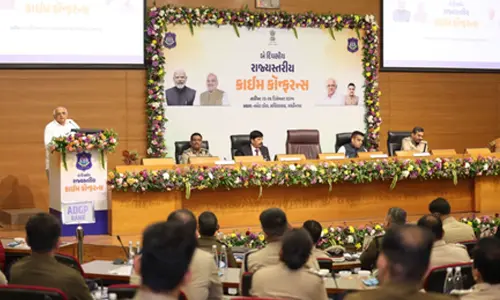Multi-category eB2B platforms are best equipped to tap the $90 -$100 Bn eB2B market opportunities by 2030- Redseer Strategy Consultants

Redseer Strategy Consultants
Redseer strategy consultants take a deep dive into India's evolving eB2B landscape and offer insights into the different models of eB2B platforms.
Redseer strategy consultants take a deep dive into India's evolving eB2B landscape and offer insights into the different models of eB2B platforms. The analysis indicates that a multi-category first-party-based model performs better in comparison to vertical models that solely focus on one category or the other.
Key Points
● General trade drives 83% of the overall $950 Bn retail market. The share of general trade is even higher in groceries, driving >90% of the market.
● eB2B market offering solutions to challenges faced by retailers and wholesalers is estimated to grow to $90-$100 Bn by 2030
● Market share of eB2B platforms has been evolving with multicategory platforms gaining significant share
● Multi-category 1P eB2B platforms are best positioned to strike the right gross margin to cost structure balance by cross leveraging assets and capabilities across categories
Bangalore: According to a report released by Redseer Strategy Consultants, the Indian retail market, worth ~ $950 Bn, is highly unorganized and dominated by general trade. While general trade drives ~83% of the overall market, its share is greater than 90% in the groceries space. The fragmented market puts retailers at a disadvantage procuring from traditional channels owing to price opacity, slow/no deliveries, stockouts, and inconsistent product quality, among other challenges. eB2B platforms now offer superior solutions for these retailers through strategic brand partnerships and eliminating intermediaries from the retail value chain.
According to Mrigank Gutgutia, partner at Redseer, India’s eB2B market is projected to grow at a CAGR of 40-45% from $5-6 Bn in CY2022 to $90-$100 Bn by 2030. Platforms catering to retailers constitute 70-80% of the eB2B market, while the remaining 20-30% is occupied by platforms catering to wholesalers. Mrigank quoted, “Growth in this market will be led by deepening penetration among retailers across categories and geographies, and a higher wallet share for eB2B platforms. Retailers will get habituated and reap the benefits offered by these platforms, such as cheaper procurement, faster deliveries, higher fill rates, and consistency in product quality.”
Going into the business model segmentation of the eB2B platforms, Redseer observes that there are limited multi-category platforms with pan-India operations across categories such as grocery (staples & FMCG), electronics and accessories, general merchandise, fashion, and others. The rest of the eB2B platforms operate in fewer categories or verticals across regional and national levels.
Talking about the success of the business models, Mrigank added, “Over the last few months, many of these vertical platforms have been struggling, and across categories have shown limited growth/ been flat or declined due to challenging unit economics and prevailing macro-economic conditions, while multi-category platforms like udaan have gained market share to reach 55-60% of the retailer-led eB2B market”. (Note (s): 1. This analysis includes only retailer-led GMV of platforms, which represents 70-80% of the overall eB2B market 2. Certain platforms which focus on HoReCa and cash & carry distribution have been excluded 3. Excludes e-Pharma platforms)
The specialized needs of retailers across categories require eB2B platforms to be highly competitive across categories. For instance, a retailer might procure rice from a particular eB2B platform and choose a different one for detergent. Unless the same platform can offer both at competitive rates, the retailer would buy from different platforms based on their margins. Enabling this competitiveness requires cross-leveraging capabilities and costs, and multi-category first-party (1P) platforms with inventory-based models have a distinct advantage.
While staples and other grocery items drive volume and demand predictability enabling low cost distribution penetration and increasing the frequency of service in any location, discretionary segments such as clothing, footwear, electronics, home & kitchen, and FMCG, boost the margins for multicategory platforms. Therefore, a multi-category approach is effective in optimizing supply chain costs as grocery contributes to higher fleet utilization while discretionary categories enable better economics.
The report continues that the multi-category approach also helps optimize go-to-market (GTM) and credit costs. Vertical platforms focused only on grocery or discretionary categories have a tough time managing GTM costs because of their low retailer density, which results in lower throughput per feet-on-street (FoS) and because of low demand predictability. However, GTM cost optimization for multi-category platforms happens through leveraging the same tech across all categories or portfolios, and further through aggregation of sub-categories within portfolios.
Reflecting on the credit costs, the reports adds that a multicategory 1P model leads to higher collection efficiency enabled by better underwriting efficacy and lower collection costs as the delivery agent helps with collection. Further, cross-leveraging the same collection infrastructure across all categories and sub-categories would also enable cost optimization.
About Redseer:
Redseer Strategy Consultants is India's largest and renowned strategy consultancy firm with a global footprint. Founded in 2009, Redseer collaborates with leaders and organizations to build thriving digital businesses. Using proprietary methodologies, deep consumer understanding, high-quality research, and an entrepreneurial mindset, Redseer offers unparalleled solutions in private equity, growth advisory, and consumer research. Headquartered in Bangalore, Redseer has a strong team of 200+ consultants in India and around the world.















